【2015中考复习方案】2015届九年级英语复习课件(山西专用):第11课时 Units+3—4 [八年级下册](共36张PPT)
文档属性
| 名称 | 【2015中考复习方案】2015届九年级英语复习课件(山西专用):第11课时 Units+3—4 [八年级下册](共36张PPT) | 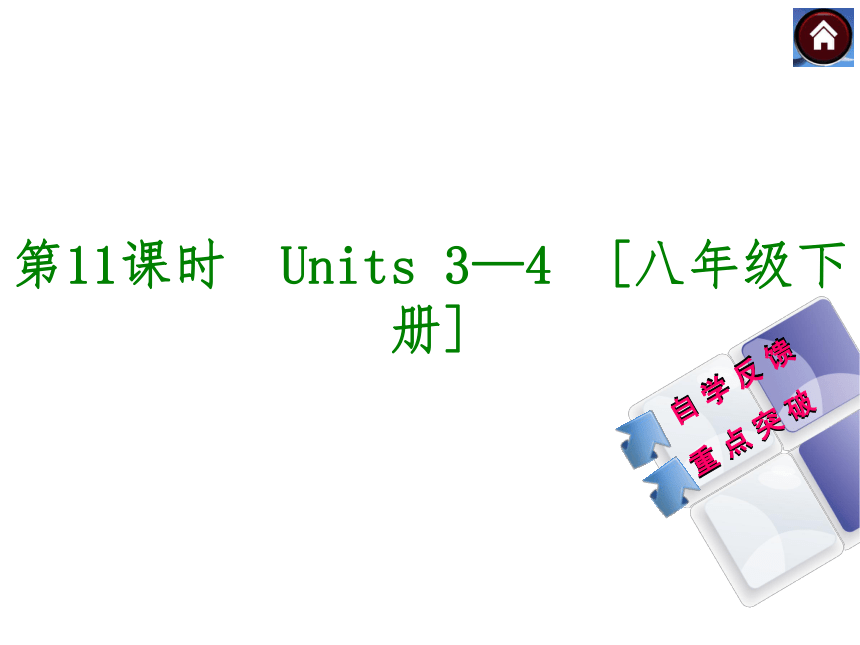 | |
| 格式 | zip | ||
| 文件大小 | 187.7KB | ||
| 资源类型 | 教案 | ||
| 版本资源 | 通用版 | ||
| 科目 | 英语 | ||
| 更新时间 | 2014-12-12 22:03:11 | ||
图片预览

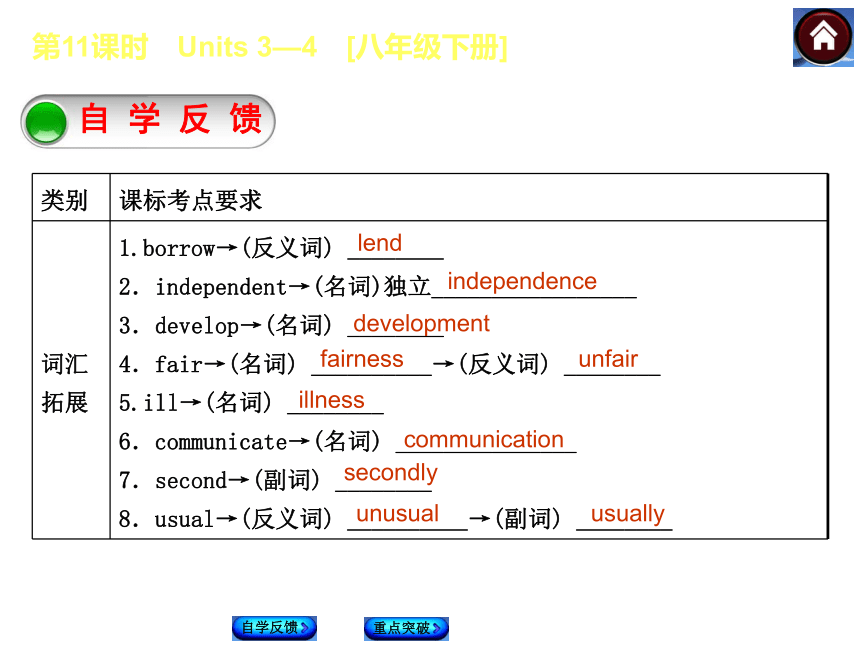
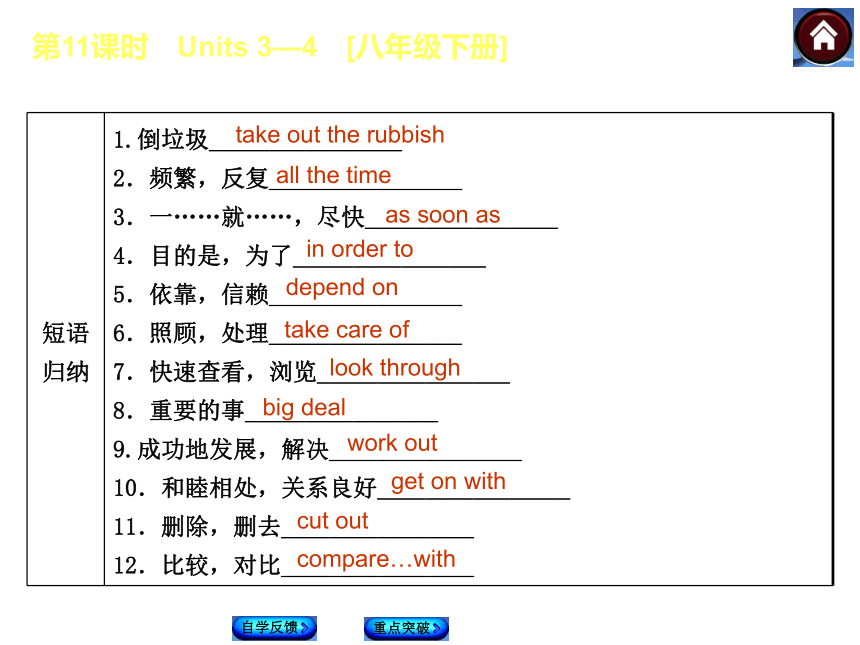
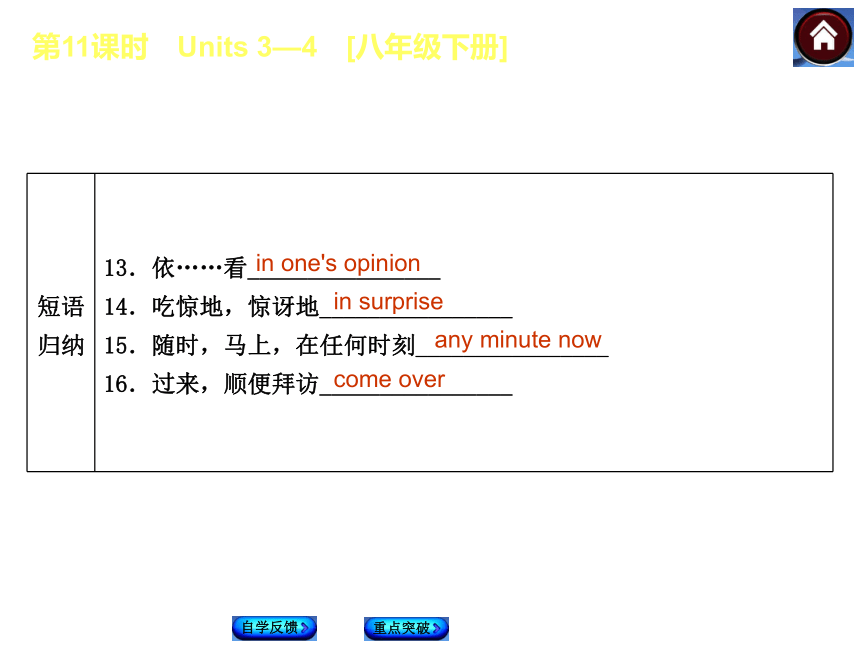
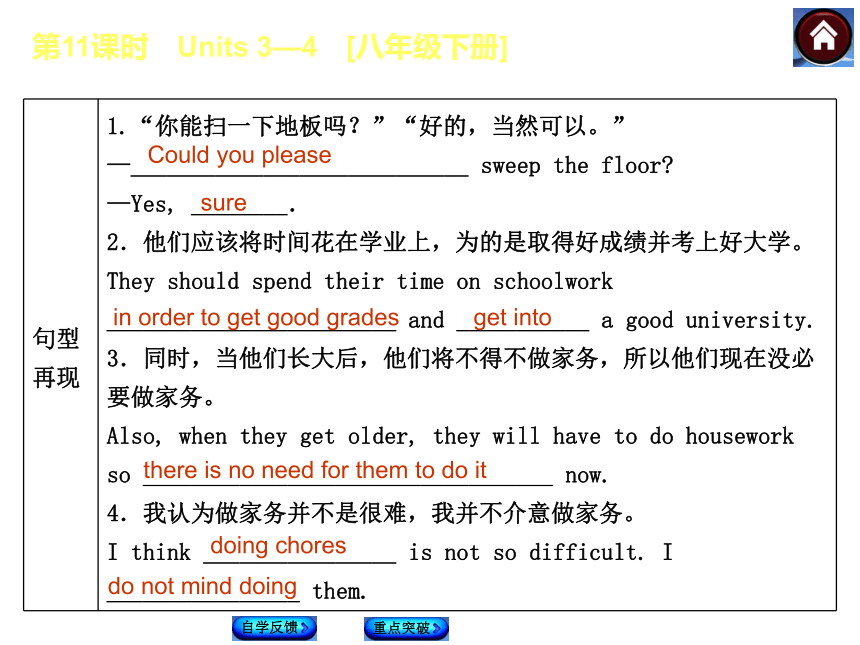
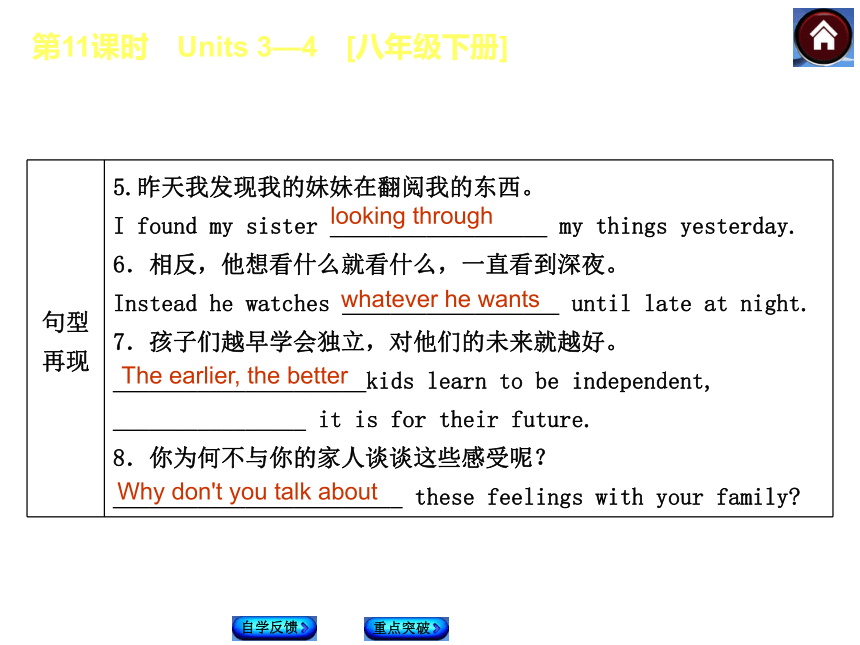
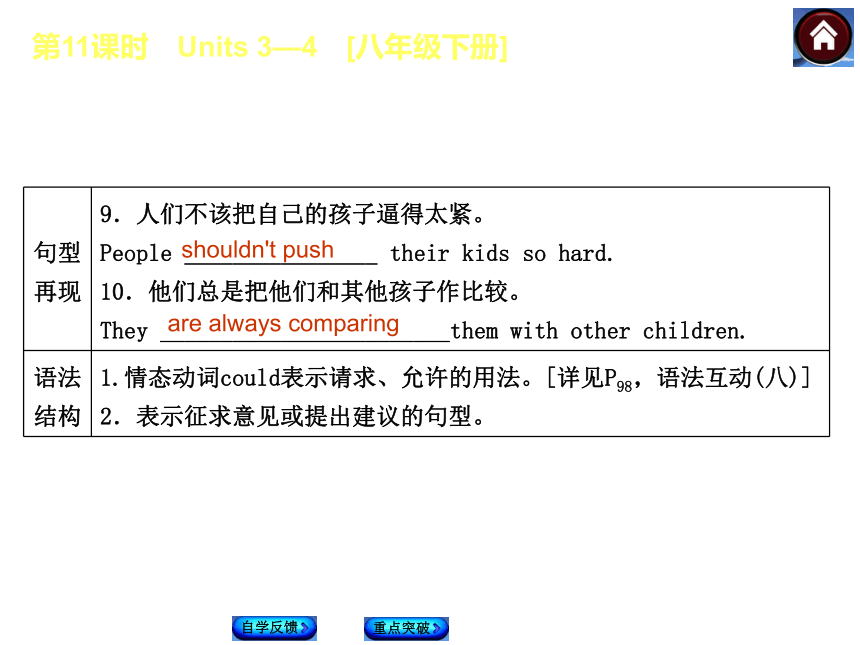
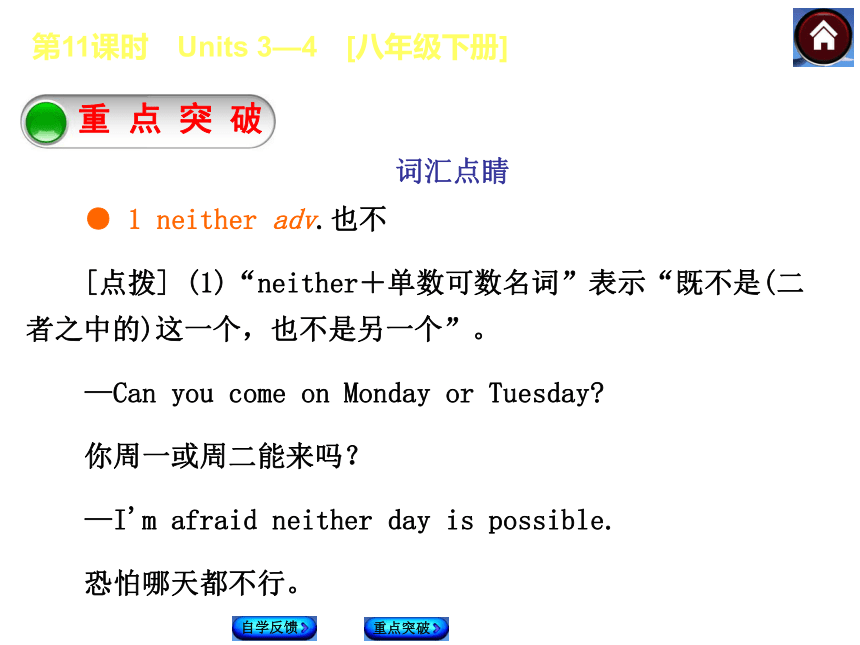
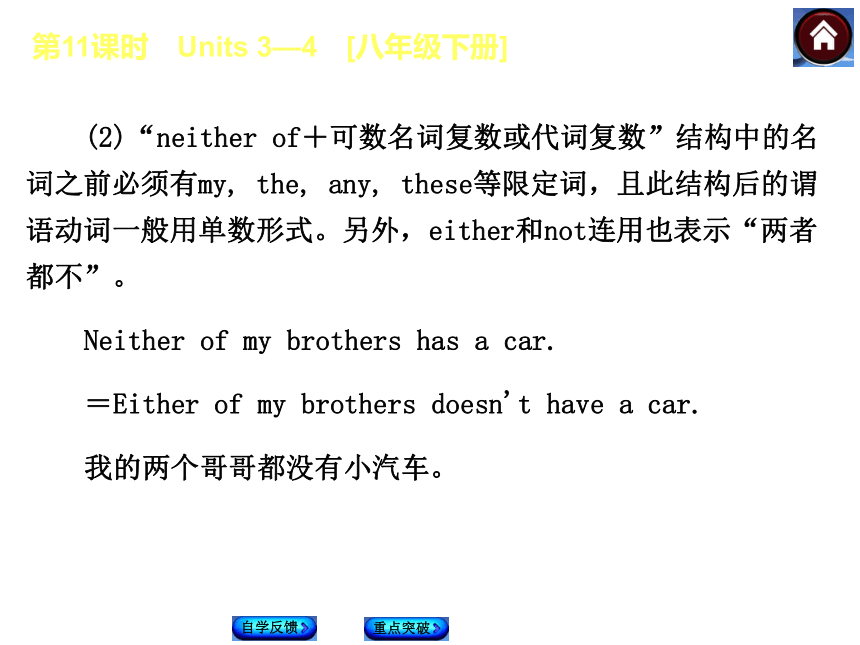
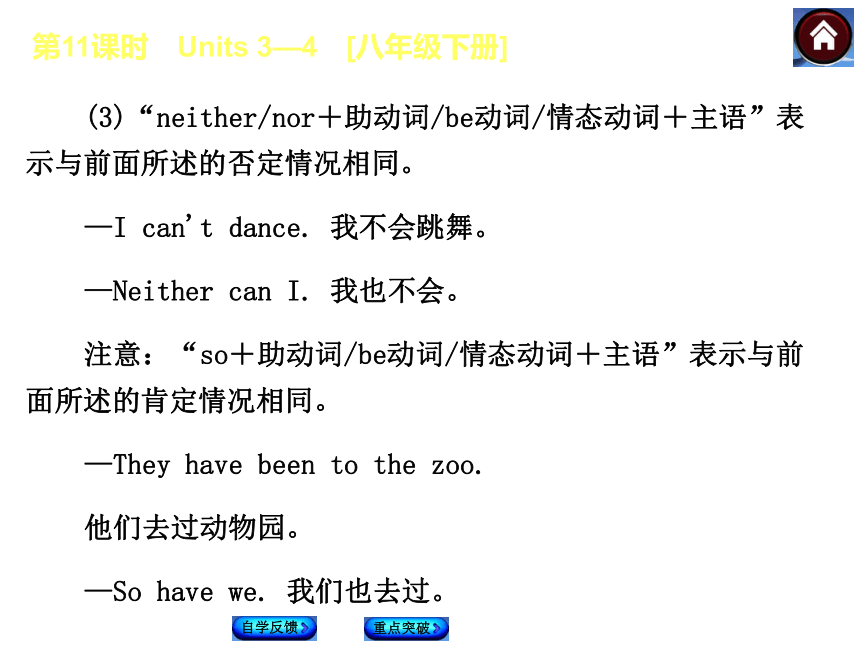
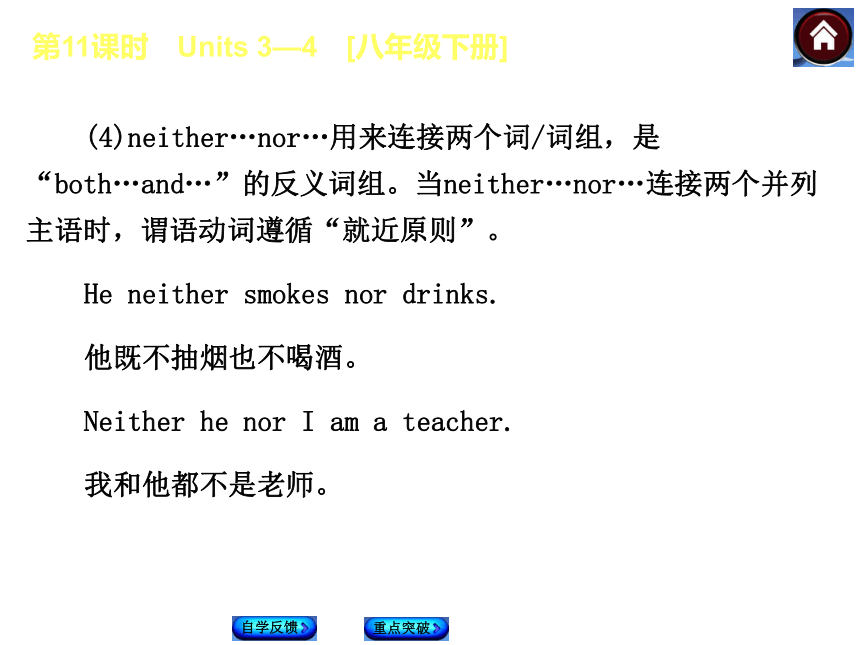
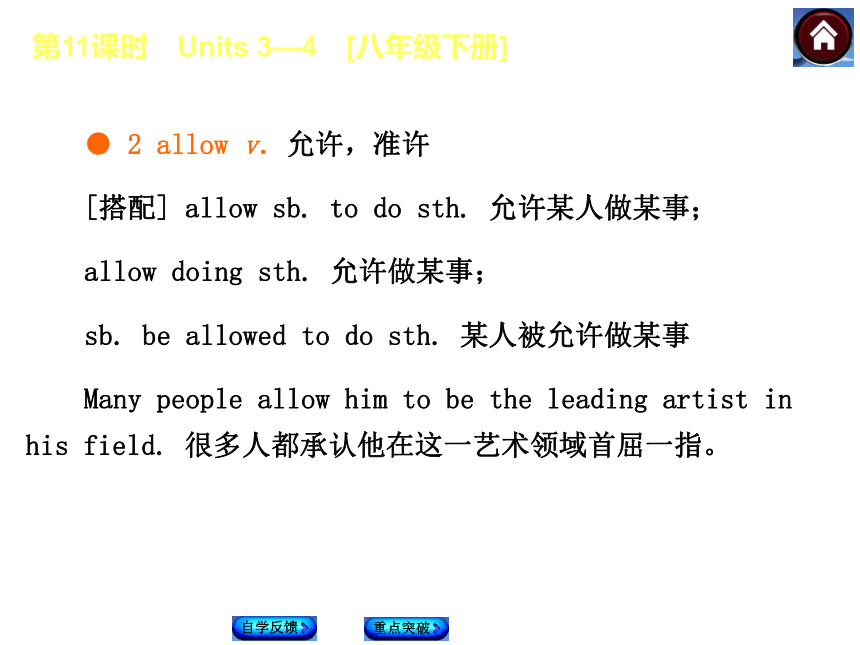
文档简介
课件36张PPT。第11课时 Units 3—4 [八年级下册]第11课时 Units 3—4 [八年级下册]自 学 反 馈 自学反馈重点突破 lend independence development fairness unfair illness communication secondly unusual usually 第11课时 Units 3—4 [八年级下册]自学反馈重点突破 take out the rubbish all the time as soon as in order to depend on take care of look through big deal work out get on with cut out compare…with 第11课时 Units 3—4 [八年级下册]自学反馈重点突破 in one's opinion in surprise any minute now come over 第11课时 Units 3—4 [八年级下册]自学反馈重点突破 Could you please sure in order to get good grades get into there is no need for them to do it doing chores do not mind doing 第11课时 Units 3—4 [八年级下册]自学反馈重点突破 looking through whatever he wants The earlier, the better Why don't you talk about 第11课时 Units 3—4 [八年级下册]自学反馈重点突破 shouldn't push are always comparing 第11课时 Units 3—4 [八年级下册]重 点 突 破 词汇点睛自学反馈重点突破 ● 1 neither adv.也不
[点拨] (1)“neither+单数可数名词”表示“既不是(二者之中的)这一个,也不是另一个”。
—Can you come on Monday or Tuesday?
你周一或周二能来吗?
—I'm afraid neither day is possible.
恐怕哪天都不行。第11课时 Units 3—4 [八年级下册](2)“neither of+可数名词复数或代词复数”结构中的名词之前必须有my, the, any, these等限定词,且此结构后的谓语动词一般用单数形式。另外,either和not连用也表示“两者都不”。
Neither of my brothers has a car.
=Either of my brothers doesn't have a car.
我的两个哥哥都没有小汽车。自学反馈重点突破 第11课时 Units 3—4 [八年级下册](3)“neither/nor+助动词/be动词/情态动词+主语”表示与前面所述的否定情况相同。
—I can't dance. 我不会跳舞。
—Neither can I. 我也不会。
注意:“so+助动词/be动词/情态动词+主语”表示与前面所述的肯定情况相同。
—They have been to the zoo.
他们去过动物园。
—So have we. 我们也去过。自学反馈重点突破 第11课时 Units 3—4 [八年级下册](4)neither…nor…用来连接两个词/词组,是“both…and…”的反义词组。当neither…nor…连接两个并列主语时,谓语动词遵循“就近原则”。
He neither smokes nor drinks.
他既不抽烟也不喝酒。
Neither he nor I am a teacher.
我和他都不是老师。自学反馈重点突破 第11课时 Units 3—4 [八年级下册]● 2 allow v.允许,准许
[搭配] allow sb. to do sth. 允许某人做某事;
allow doing sth. 允许做某事;
sb. be allowed to do sth. 某人被允许做某事
Many people allow him to be the leading artist in his field. 很多人都承认他在这一艺术领域首屈一指。自学反馈重点突破 第11课时 Units 3—4 [八年级下册]● 3 return v.归来,回来,返回
[点拨] return 相当于give back,常用于“return sth. to sb.”结构中。
Return the book to the library. 把书归还给图书馆。自学反馈重点突破 第11课时 Units 3—4 [八年级下册][拓展] return 还可表示“回来;返回”(=come/get back),常用于“return to someplace”结构中。
She's returning to Australia tomorrow.
明天她要返回澳大利亚了。
[注意] return已含有back的意思,所以其后不能接back 自学反馈重点突破 第11课时 Units 3—4 [八年级下册]巧辨异同自学反馈重点突破 ● 1 borrow/lend/keep 第11课时 Units 3—4 [八年级下册]● 2 offer/provide
(1)offer sb. sth.=offer sth. to sb.为某人提供某物;
offer to do sth. 主动提出做某事
The flight attendant offers me hot water and food.
=The flight attendant offers hot water and food to me. 空乘人员主动给我提供热水和食物。
She offers to show us around.
她主动提出带我们参观。自学反馈重点突破 第11课时 Units 3—4 [八年级下册](2)provide 指为应付意外、紧急情况等做好充分准备而“供给, 提供”。provide sb. with sth.=provide sth. for sb., 意为“为某人提供某物”。
The school provides food for the students.
=The school provides the students with food.
学校为学生们提供伙食。自学反馈重点突破 第11课时 Units 3—4 [八年级下册]● 3 since/for自学反馈重点突破 第11课时 Units 3—4 [八年级下册]The factory has been open for a month.
=The factory has been open since a month ago.
这家工厂开业一个月了。
[注意] since还可表示原因,意为“既然,因为”。
Since it is late, I shall go home now.
由于晚了, 我现在要回家了。自学反馈重点突破 第11课时 Units 3—4 [八年级下册]● 4 instead/instead of/rather than
(1)instead是副词,意为“代替,而不是”,在句中充当状语,常用于句首,起连接上下句的作用。
Tom doesn't study hard. Instead, he plays football all day. 汤姆不努力学习,反而整天踢足球。
(2)instead of 和rather than都表示“代替,而不是”,两者都可接名词、代词,但前者接动词时要用v.?ing形式,后者接动词时要用原形。它们在一定情况下可相互转换。
We went there on foot instead of taking a bus. 自学反馈重点突破 第11课时 Units 3—4 [八年级下册]我们没乘公共汽车,而是步行去了那儿。
She wants to go swimming tomorrow instead of playing basketball.
=She wants to go swimming tomorrow rather than play basketball.
=She doesn't want to play basketball. She wants to go swimming instead.
她明天想去游泳,而不是打篮球。自学反馈重点突破 第11课时 Units 3—4 [八年级下册]句型透视自学反馈重点突破 ● 1 —Could you please sweep the floor?
你能扫一下地板吗?
—Yes, sure. 好的,当然可以。
[句型] “Could you (please) + 动词原形?”意为“请你……好吗?”其否定式为“Could you (please) not+动词原形?”肯定回答:Yes, sure/certainly/of course.否定回答: Sorry, I can't.
—Could you please answer the telephone?第11课时 Units 3—4 [八年级下册]请你接电话好吗?
—Sure./Sorry, I can't. I'm too busy now.
当然可以。/对不起,我不能,我现在太忙。
[拓展] (1)当could用作情态动词can的过去式时,表示过去的能力,肯定和否定回答仍用could。
—Could you swim when you were five?
你五岁时会游泳吗?
—Yes, I could. 是的,我会。自学反馈重点突破 第11课时 Units 3—4 [八年级下册](2)could 还可表示推测,意为“可能”。
—Do you know where Peter is?
你知道彼得在哪儿吗?
—He could be in the library. 他可能在图书馆。自学反馈重点突破 第11课时 Units 3—4 [八年级下册]● 2 They should spend their time on schoolwork in order to get good grades and get into a good university.他们应该将时间花在学业上,为的是取得好成绩并考上好大学。
[句型] in order to do sth. 意为“为了/以便做某事”,可放在句首,也可放在句中,其否定形式为“in order not to do sth.”,意为“为了不做……”。
[拓展] “in order+that从句”也可表示“为了,以便”,从句中常用can, may, could, might等情态动词。
My father works hard in order that he may support us. 我父亲辛苦地工作是为了养家。自学反馈重点突破 第11课时 Units 3—4 [八年级下册]● 3 Why don't you talk about these feelings with your family?你为何不与你的家人谈谈这些感受呢?
[句型] “Why don't you do …?”是提建议的句型,表示“你为什么不做……呢?”该结构相当于“Why not do sth.?”或“How/What about doing sth.?”自学反馈重点突破 第11课时 Units 3—4 [八年级下册](2)used to do 的疑问句形式是“Did…use to do?”或“Used…to do?”
Did she use to get up early?
=Used she to get up early? 她过去经常早起吗?
(3)used to 的反意疑问句由助动词did(n't)或used(n't)构成。
Mario used to be late for school, didn't/usedn't he?
马里奥以前上学经常迟到,不是吗?自学反馈重点突破 第11课时 Units 3—4 [八年级下册][拓展] 当征求他人意见或向他人提建议时,还可用下列句型:
Let's do… Shall we…?
Would you mind (not) doing…?
It's better to do… You'd better (not) do…
You should/need… Would you like to do…?
Could/Would you (please) do…? 自学反馈重点突破 第11课时 Units 3—4 [八年级下册]即时自测自学反馈重点突破 Ⅰ.单项选择
1.—May I ________ the English dictionary?
—Yes. You can ________ it for two weeks.
A.borrow; lend B.borrow; borrow
C.borrow; keepC第11课时 Units 3—4 [八年级下册]2.—________ buy a scarf?
—Good idea!
A.Why don't B.Why not
C.What about自学反馈重点突破 B第11课时 Units 3—4 [八年级下册]3.We________ to smoke in public.
A.don't allow B.aren't allowed
C.will allow自学反馈重点突破 B第11课时 Units 3—4 [八年级下册]4.We've got no coffee. Let's have tea ________.
A.either B.however
C.instead自学反馈重点突破 C第11课时 Units 3—4 [八年级下册]5.—Could you go shopping with me tomorrow?
—________. My father and I will go to Wuhan tomorrow.
A.I think so
B.Yes, I hope so
C.Sorry, I'm afraid I can't 自学反馈重点突破 C第11课时 Units 3—4 [八年级下册]Ⅱ.选词填空
(A)根据句意,用borrow, lend或keep的适当形式填空。
1.Can you ________ your car to me?
2.I often ________ books from the school library.
3.You can ________ my bike for two days.
(B)根据句意,用since或for填空。
4.We have learnt English ________ six years.自学反馈重点突破 lend borrow keep for 第11课时 Units 3—4 [八年级下册]5.Mrs. Li has taught English in the school ________ ten years ago.
6.—How long have you lived in the new flat?
—________ 2012.
(C)根据句意,用instead, instead of或rather than填空。自学反馈重点突破 since Since 第11课时 Units 3—4 [八年级下册]7.—How will she deal with the work?
—She doesn't want to do it by herself. She wants to ask her sister to do it ________.
8.—Let's go hiking ___________ staying at home, shall we?
—Good idea!
9.I would like to go home _________go to the zoo.
10.I have come ________ my brother. He is ill. 自学反馈重点突破 instead instead of rather than instead of
[点拨] (1)“neither+单数可数名词”表示“既不是(二者之中的)这一个,也不是另一个”。
—Can you come on Monday or Tuesday?
你周一或周二能来吗?
—I'm afraid neither day is possible.
恐怕哪天都不行。第11课时 Units 3—4 [八年级下册](2)“neither of+可数名词复数或代词复数”结构中的名词之前必须有my, the, any, these等限定词,且此结构后的谓语动词一般用单数形式。另外,either和not连用也表示“两者都不”。
Neither of my brothers has a car.
=Either of my brothers doesn't have a car.
我的两个哥哥都没有小汽车。自学反馈重点突破 第11课时 Units 3—4 [八年级下册](3)“neither/nor+助动词/be动词/情态动词+主语”表示与前面所述的否定情况相同。
—I can't dance. 我不会跳舞。
—Neither can I. 我也不会。
注意:“so+助动词/be动词/情态动词+主语”表示与前面所述的肯定情况相同。
—They have been to the zoo.
他们去过动物园。
—So have we. 我们也去过。自学反馈重点突破 第11课时 Units 3—4 [八年级下册](4)neither…nor…用来连接两个词/词组,是“both…and…”的反义词组。当neither…nor…连接两个并列主语时,谓语动词遵循“就近原则”。
He neither smokes nor drinks.
他既不抽烟也不喝酒。
Neither he nor I am a teacher.
我和他都不是老师。自学反馈重点突破 第11课时 Units 3—4 [八年级下册]● 2 allow v.允许,准许
[搭配] allow sb. to do sth. 允许某人做某事;
allow doing sth. 允许做某事;
sb. be allowed to do sth. 某人被允许做某事
Many people allow him to be the leading artist in his field. 很多人都承认他在这一艺术领域首屈一指。自学反馈重点突破 第11课时 Units 3—4 [八年级下册]● 3 return v.归来,回来,返回
[点拨] return 相当于give back,常用于“return sth. to sb.”结构中。
Return the book to the library. 把书归还给图书馆。自学反馈重点突破 第11课时 Units 3—4 [八年级下册][拓展] return 还可表示“回来;返回”(=come/get back),常用于“return to someplace”结构中。
She's returning to Australia tomorrow.
明天她要返回澳大利亚了。
[注意] return已含有back的意思,所以其后不能接back 自学反馈重点突破 第11课时 Units 3—4 [八年级下册]巧辨异同自学反馈重点突破 ● 1 borrow/lend/keep 第11课时 Units 3—4 [八年级下册]● 2 offer/provide
(1)offer sb. sth.=offer sth. to sb.为某人提供某物;
offer to do sth. 主动提出做某事
The flight attendant offers me hot water and food.
=The flight attendant offers hot water and food to me. 空乘人员主动给我提供热水和食物。
She offers to show us around.
她主动提出带我们参观。自学反馈重点突破 第11课时 Units 3—4 [八年级下册](2)provide 指为应付意外、紧急情况等做好充分准备而“供给, 提供”。provide sb. with sth.=provide sth. for sb., 意为“为某人提供某物”。
The school provides food for the students.
=The school provides the students with food.
学校为学生们提供伙食。自学反馈重点突破 第11课时 Units 3—4 [八年级下册]● 3 since/for自学反馈重点突破 第11课时 Units 3—4 [八年级下册]The factory has been open for a month.
=The factory has been open since a month ago.
这家工厂开业一个月了。
[注意] since还可表示原因,意为“既然,因为”。
Since it is late, I shall go home now.
由于晚了, 我现在要回家了。自学反馈重点突破 第11课时 Units 3—4 [八年级下册]● 4 instead/instead of/rather than
(1)instead是副词,意为“代替,而不是”,在句中充当状语,常用于句首,起连接上下句的作用。
Tom doesn't study hard. Instead, he plays football all day. 汤姆不努力学习,反而整天踢足球。
(2)instead of 和rather than都表示“代替,而不是”,两者都可接名词、代词,但前者接动词时要用v.?ing形式,后者接动词时要用原形。它们在一定情况下可相互转换。
We went there on foot instead of taking a bus. 自学反馈重点突破 第11课时 Units 3—4 [八年级下册]我们没乘公共汽车,而是步行去了那儿。
She wants to go swimming tomorrow instead of playing basketball.
=She wants to go swimming tomorrow rather than play basketball.
=She doesn't want to play basketball. She wants to go swimming instead.
她明天想去游泳,而不是打篮球。自学反馈重点突破 第11课时 Units 3—4 [八年级下册]句型透视自学反馈重点突破 ● 1 —Could you please sweep the floor?
你能扫一下地板吗?
—Yes, sure. 好的,当然可以。
[句型] “Could you (please) + 动词原形?”意为“请你……好吗?”其否定式为“Could you (please) not+动词原形?”肯定回答:Yes, sure/certainly/of course.否定回答: Sorry, I can't.
—Could you please answer the telephone?第11课时 Units 3—4 [八年级下册]请你接电话好吗?
—Sure./Sorry, I can't. I'm too busy now.
当然可以。/对不起,我不能,我现在太忙。
[拓展] (1)当could用作情态动词can的过去式时,表示过去的能力,肯定和否定回答仍用could。
—Could you swim when you were five?
你五岁时会游泳吗?
—Yes, I could. 是的,我会。自学反馈重点突破 第11课时 Units 3—4 [八年级下册](2)could 还可表示推测,意为“可能”。
—Do you know where Peter is?
你知道彼得在哪儿吗?
—He could be in the library. 他可能在图书馆。自学反馈重点突破 第11课时 Units 3—4 [八年级下册]● 2 They should spend their time on schoolwork in order to get good grades and get into a good university.他们应该将时间花在学业上,为的是取得好成绩并考上好大学。
[句型] in order to do sth. 意为“为了/以便做某事”,可放在句首,也可放在句中,其否定形式为“in order not to do sth.”,意为“为了不做……”。
[拓展] “in order+that从句”也可表示“为了,以便”,从句中常用can, may, could, might等情态动词。
My father works hard in order that he may support us. 我父亲辛苦地工作是为了养家。自学反馈重点突破 第11课时 Units 3—4 [八年级下册]● 3 Why don't you talk about these feelings with your family?你为何不与你的家人谈谈这些感受呢?
[句型] “Why don't you do …?”是提建议的句型,表示“你为什么不做……呢?”该结构相当于“Why not do sth.?”或“How/What about doing sth.?”自学反馈重点突破 第11课时 Units 3—4 [八年级下册](2)used to do 的疑问句形式是“Did…use to do?”或“Used…to do?”
Did she use to get up early?
=Used she to get up early? 她过去经常早起吗?
(3)used to 的反意疑问句由助动词did(n't)或used(n't)构成。
Mario used to be late for school, didn't/usedn't he?
马里奥以前上学经常迟到,不是吗?自学反馈重点突破 第11课时 Units 3—4 [八年级下册][拓展] 当征求他人意见或向他人提建议时,还可用下列句型:
Let's do… Shall we…?
Would you mind (not) doing…?
It's better to do… You'd better (not) do…
You should/need… Would you like to do…?
Could/Would you (please) do…? 自学反馈重点突破 第11课时 Units 3—4 [八年级下册]即时自测自学反馈重点突破 Ⅰ.单项选择
1.—May I ________ the English dictionary?
—Yes. You can ________ it for two weeks.
A.borrow; lend B.borrow; borrow
C.borrow; keepC第11课时 Units 3—4 [八年级下册]2.—________ buy a scarf?
—Good idea!
A.Why don't B.Why not
C.What about自学反馈重点突破 B第11课时 Units 3—4 [八年级下册]3.We________ to smoke in public.
A.don't allow B.aren't allowed
C.will allow自学反馈重点突破 B第11课时 Units 3—4 [八年级下册]4.We've got no coffee. Let's have tea ________.
A.either B.however
C.instead自学反馈重点突破 C第11课时 Units 3—4 [八年级下册]5.—Could you go shopping with me tomorrow?
—________. My father and I will go to Wuhan tomorrow.
A.I think so
B.Yes, I hope so
C.Sorry, I'm afraid I can't 自学反馈重点突破 C第11课时 Units 3—4 [八年级下册]Ⅱ.选词填空
(A)根据句意,用borrow, lend或keep的适当形式填空。
1.Can you ________ your car to me?
2.I often ________ books from the school library.
3.You can ________ my bike for two days.
(B)根据句意,用since或for填空。
4.We have learnt English ________ six years.自学反馈重点突破 lend borrow keep for 第11课时 Units 3—4 [八年级下册]5.Mrs. Li has taught English in the school ________ ten years ago.
6.—How long have you lived in the new flat?
—________ 2012.
(C)根据句意,用instead, instead of或rather than填空。自学反馈重点突破 since Since 第11课时 Units 3—4 [八年级下册]7.—How will she deal with the work?
—She doesn't want to do it by herself. She wants to ask her sister to do it ________.
8.—Let's go hiking ___________ staying at home, shall we?
—Good idea!
9.I would like to go home _________go to the zoo.
10.I have come ________ my brother. He is ill. 自学反馈重点突破 instead instead of rather than instead of
